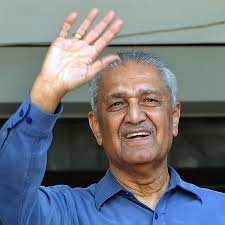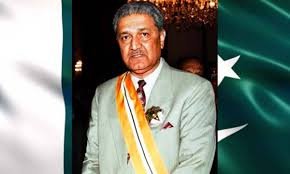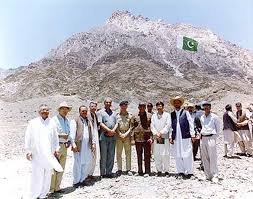Dr. Abdul Qadeer Khan, fondly known as the father of Pakistan’s nuclear program, is one of the best-known scientists in Pakistan. His monumental contribution to the nuclear capabilities of Pakistan has transformed him into a national icon. This article gives an in-depth view of Dr. Abdul Qadeer Khan’s life, his scientific achievements, and his enduring legacy in Pakistan and around the world. This article will attempt to give a well-rounded view of Dr. Abdul Qadeer Khan’s life and achievements with a focus on SEO-friendly keywords such as “Dr. Abdul Qadeer Khan,” “Pakistan nuclear program,” “atomic scientist,” and “Pakistani national hero.”

Early Life and Education
Dr. Abdul Qadeer Khan was born on April 1, 1936, in Bhopal, India, before the partition of British India. During the partition, his family migrated to Karachi in Pakistan. He did all his early education in Karachi. The young fellow showed a keen interest in science and engineering. He then went on to his master’s in metallurgy at a university in Europe, where he gained a Master’s from the Delft University of Technology in the Netherlands and a Ph.D. in metallurgical engineering from the Catholic University of Leuven in Belgium.
His academic journey in Europe, besides equipping him with the knowledge of advanced scientific status, exposed him to the most cutting-edge nuclear technology. In the Netherlands, he would first experience the details of uranium enrichment—a technology crucially pivotal to the working of a nuclear weapon.

Important Contributions to Pakistan’s Nuclear Program
The 1971 war between Pakistan and India, which resulted in the independence of Bangladesh, was a pivotal moment in Dr. Khan’s life. He was determined not to let Pakistan be defenseless again; hence, he approached then-Prime Minister Zulfikar Ali Bhutto in 1974 and offered his services to assist Pakistan in developing nuclear deterrence capabilities. India had successfully tested its first nuclear bomb in 1974, leaving Pakistan at the heels of a rush to build up its nuclear capabilities.
In 1976, Dr. Khan was inducted into the Engineering Research Laboratories, which were later renamed to become the Khan Research Laboratories (KRL) in his name. KRL under Dr. Khan headed Pakistan’s nuclear weapons program. Mastering gas centrifuge technology, Dr. Khan greatly helped Pakistan develop its capabilities to enrich uranium. Within a decade, Pakistan had gained all the technology it needed to become a nuclear weapons state.
Pakistan conducted its first successful nuclear tests in May 1998 and became the first Muslim-majority country with nuclear capability. The achievement was heavily accredited to Dr. Abdul Qadeer Khan, who instantly became a national hero. The nuclear tests marked the end of Pakistan’s history with an element of security and pride.
The Science Behind Dr. Khan’s Nuclear Program
The development of nuclear weapons would require the enrichment of uranium; this is a process whereby the isotopes of uranium are separated to produce material that can sustain nuclear fission. Uranium enrichment was one area in which Dr. Khan had been an expert in enabling Pakistan to achieve its goal.
The use of gas centrifuges, a technology more efficient and cost-effective than the gaseous diffusion method used earlier, allowed Pakistan to enrich uranium to the levels needed for nuclear weapons. The KRL-developed centrifuge technology not only enabled Pakistan to produce nuclear weapons but also made it a contributor to many scientific developments in Pakistan’s defense and energy sectors.
His work was concentrated on the development of a safe and independent nuclear infrastructure, which today forms the very nucleus of Pakistan’s defense policy.

Controversy Over Dr. Abdul Qadeer Khan
A great hero in Pakistan, yet controversy was never far away from his career. He was accused at the dawn of the 2000s of being involved in nuclear proliferation by sharing nuclear technology and designs with many countries. On national television in 2004, Dr. Khan confessed before the world that he sold nuclear technology to Iran, Libya, and North Korea. This came as a shock to the world, and it made the programs of Pakistan under scrutiny very tough.
After this confession, house arrest was given to Dr. Khan, and at once, the Pakistani government distanced itself from the same action. Dr. Khan soon retracted those statements, but his otherwise gilded career would not escape the shadow of the affair. The world was still talking about his nuclear proliferation, and many within Pakistan looked upon him as a patriot who put his national security above everything.
Despite all this controversy, Dr. Khan remains a respected figure in Pakistan. His contributions towards the security of the nation are widely acknowledged, and his status as a national hero remains largely intact.
Legacy of Dr. Abdul Qadeer Khan
But as deep as this legacy is complex and of the utmost depth and scale: For Pakistan, he stood out as a symbol of national resilience, scientific greatness, and national pride in which work in nuclear science bore wide-ranging implications such that the nuclear deterrent is ever serving as a balancing feature on the region, now not so much because of current longstanding tensions with India.
Dr. Khan also focused on scientific education and development in Pakistan. He was a strong advocate of investment in science and technology, though his efforts were not limited to the nuclear program only. During his career, Dr. Khan advocated for several research and development initiatives, including metallurgy and missile technology, which helped to strengthen the defense systems of Pakistan.
Apart from his research work in nuclear technology, he founded several educational institutions and research centers in Pakistan to spread scientific knowledge and to motivate the next generations of scientists in Pakistan.

Awards and Honors
Abdul Qadeer Khan has received numerous awards and honors during his career, both in and outside Pakistan. The most prominent ones include:
Nishan-e-Imtiaz-Pakistan’s highest civilian award was conferred upon Dr. Khan in recognition of their services to the country.
Hilal-e-Imtiaz is another top award that recognizes the scientific and national contributions made by Dr. Khan.
Honorary Doctorates and Awards – There were numerous honorary doctorates and awards by different Pakistani and foreign academic institutions given to Dr. Khan.
A research institution and several facilities as part of science and national security became entitled in his name besides streets and education institutions.
Acknowledgments reflect the success, however modest, of that giant.
Dr. Abdul Qadeer Khan believed that the true power of Pakistan is its scientific brain. He very often urged Pakistan to invest in education and research for a scientifically enlightened and technologically advanced society. His dream is much broader than nuclear science itself. He demanded self-sufficiency in other fields also, such as energy, agriculture, and medical sciences of Pakistan.
Dr. Khan’s efforts and passion for education and dissemination of knowledge continue to inspire new generations of Pakistani youth who wish to pursue science and technology careers. Thousands of students, scientists, and engineers regard him as an icon and a source of inspiration.

Criticism and Debate
Though he is depicted as a national hero, it is a fact that he played a bad role in the issue of nuclear proliferation throughout the world. His opponents mention that his activities created nuclear instability and pointed out claims that his network fed the nuclear ambitions in volatile regions. His supporters bring before that his activities were motivated by patriotism and a desire to protect Pakistan from its external threats.
The controversy surrounding Dr. Khan’s legacy thrusts complex issues of nuclear diplomacy and ethics accompanying nuclear technology to the fore. His activities have been characterized as irresponsible by some, but to others, they were only a matter of survival in a competitive and sometimes hostile international environment.

The Later Years of Dr. Abdul Qadeer Khan
He mostly lived the latter half of his life indoors in Islamabad house as a prisoner of movement with due care. Safety concerns and all sorts of reactions after proliferation row 2004 led to his inability to move. His public speaking continued though he gave interviews only by his words from newspapers, books, etc.
On the 10th of October 2021, he left for his heavenly abode at the age of 85 years. His demise caused a huge response in terms of pain from the people of Pakistan in and outside the country as thousands followed him to his state funeral which included government officers and members of the armed forces. This has finally laid an era to rest but it cannot in any way bring down what he has accomplished for the security and scientific advancement of Pakistan.
Conclusion
The work of Dr. Abdul Qadeer Khan has left an indelible mark on Pakistan’s history and identity. His love for science and national security transformed Pakistan into a nuclear power, giving the country a deterrence that has been shaping South Asia’s geopolitical landscape. Even in controversies, millions of Pakistanis see in him a symbol of resilience and patriotism.
The life of Dr. Khan reminds one of the power of scientific knowledge and the impact determined individuals can have on national and global affairs. It is given that contributions toward Pakistan’s nuclear program coupled with their commitment to promoting scientific education have given him a place in Pakistan’s national history forever.






















































